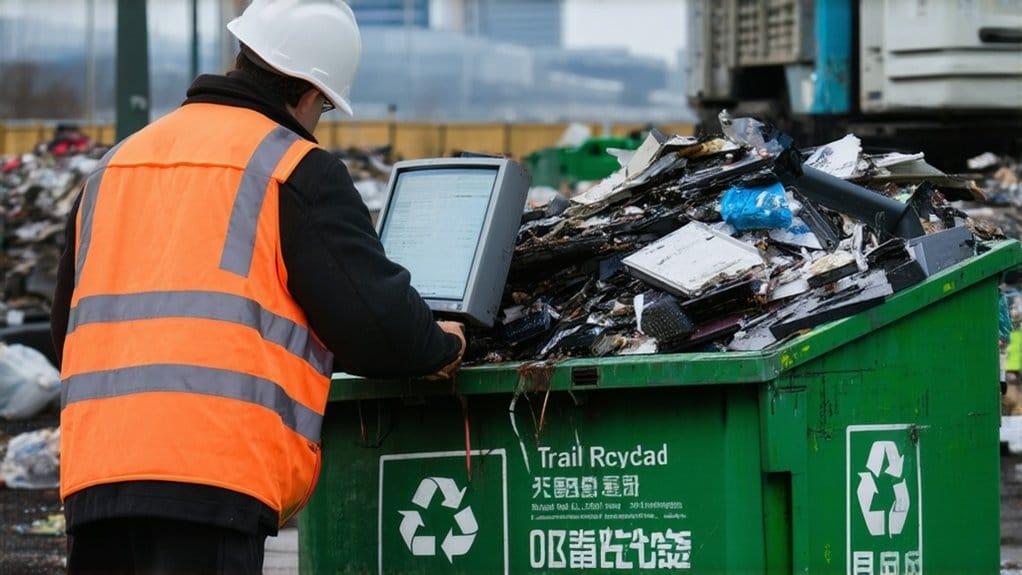You’ve got a stash of old electronics collecting dust in your Ottawa home, but you’re not sure how to dispose of them responsibly. You start by cleaning and organizing your devices, removing any accessories and batteries. But before you drop them off at a recycling center, you need to wipe your personal data from the devices. A factory reset or certified data erasure software will do the trick. Now, you’re ready to take the next step, but where do you go from here? Ottawa has specific guidelines for electronic waste disposal, and it’s crucial to follow them.
Benefits of Electronics Recycling
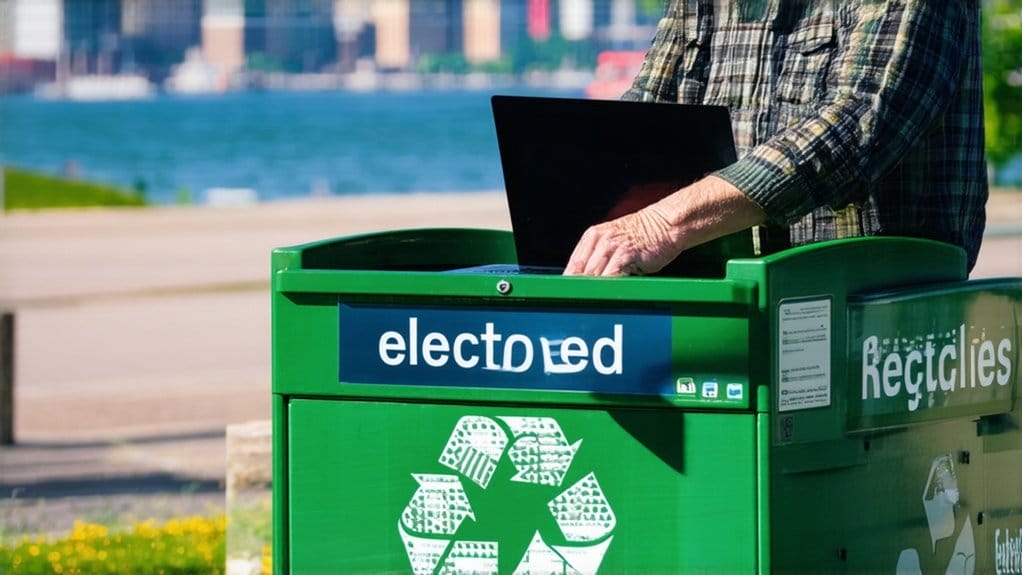
Numerous benefits are associated with electronics recycling, making it an essential practice in today’s world. By recycling your electronics, you’re helping to reduce landfill waste and prevent toxic substances like lead, mercury, and cadmium from entering the environment.
You’re also conserving natural resources by recovering valuable materials such as copper, silver, and gold from electronics.
Electronics recycling has economic benefits as well. It creates jobs and stimulates economic growth in the recycling sector, generating revenue from the sale of recycled materials. In 2019, the world generated 53.6 million metric tonnes of e-waste, highlighting the growing need for responsible e-waste management.
You’ll also save money on disposal costs and contribute to tax revenues and wages. Furthermore, electronics recycling promotes a circular economy by reusing and recycling materials.
Recycling your electronics also protects human health by preventing exposure to toxic substances and reducing health risks associated with improper e-waste disposal.
Additionally, it supports environmental conservation and sustainability, enhances business reputation through responsible e-waste practices, and contributes to the development of a more sustainable and circular economy.
Finding Recycling Centers in Ottawa
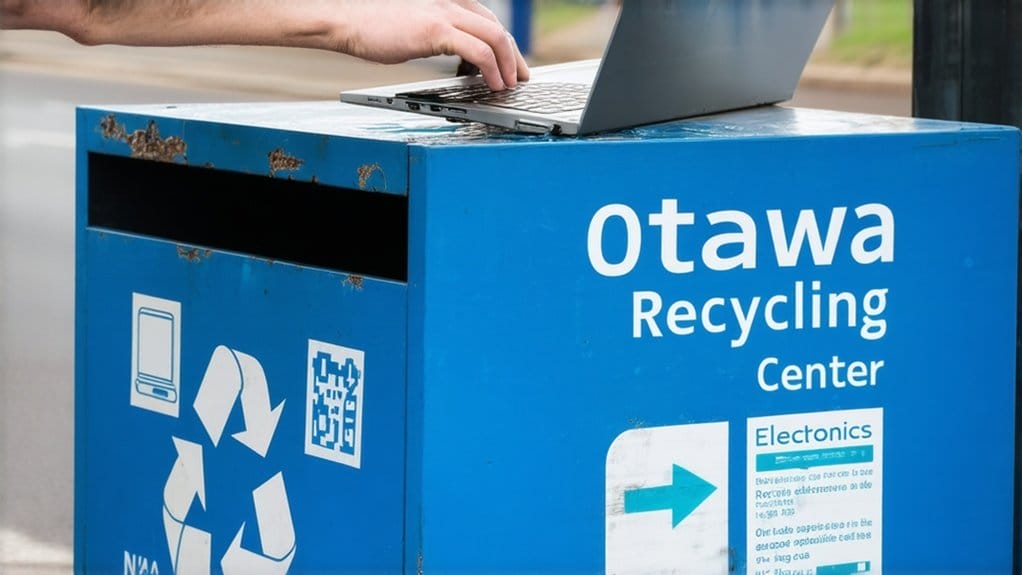
Now that you’re aware of the benefits of electronics recycling, you’re likely wondering where to take your unwanted devices in Ottawa. The city offers various certified electronics recycling centers for safe and environmentally friendly disposal.
Staples on Bank Street and Best Buy Canada – Ottawa East on Coventry Road are among the authorized recycling centers that accept various electronics for recycling.
You can also drop off your electronic devices at designated sites like Henry’s on Bank Street and Fisher Pharmacy Ltd in Vanier. Some companies, such as eCycle Solutions, offer pickup services for bulk electronics. In addition to responsibly disposing of your old electronics, consider exploring local workshops that focus on sustainability and creative repurposing. These sessions often showcase innovative home design and decor ideas, helping you to transform your outdated gadgets into unique decorative pieces. By incorporating eco-friendly practices into your home decor, you can create a stylish space while also minimizing waste.
If you’re looking for specialized services, TechReset offers on-demand customer support and is certified by R2, ISO 9000, and Blancco standards for consistent and high-quality service.
When selecting a recycling center, verify they accept the types of electronics you’re looking to dispose of, such as laptops, cell phones, and TVs.
eCycle Solutions and TechReset accept a wide range of electronics. By choosing a certified recycling center, you can trust that your electronics will be properly disposed of, refurbished, or shredded.
Take the next step in electronics recycling by finding a certified recycling center near you and responsibly dispose of your unwanted devices.
Preparing Electronics for Recycling
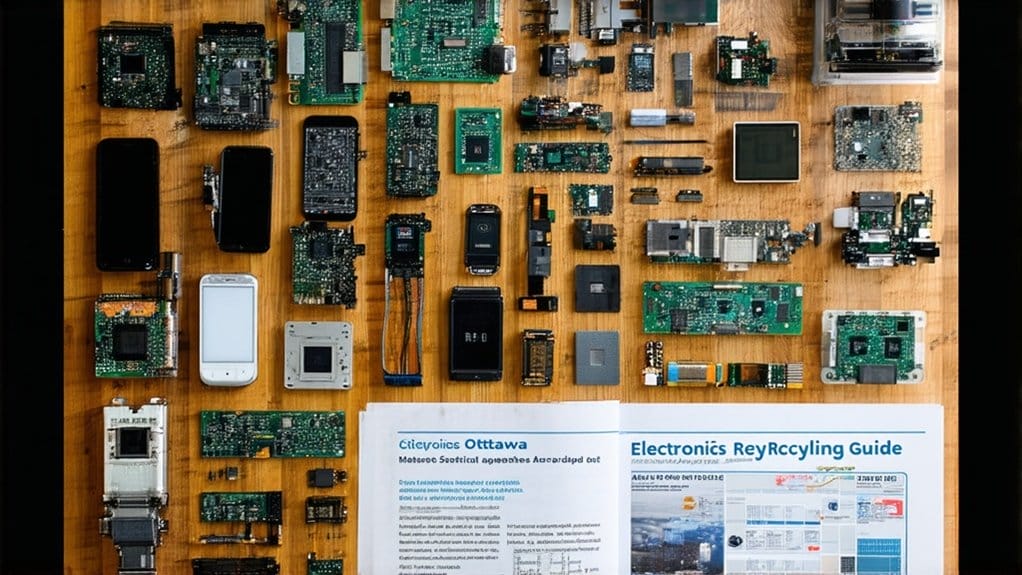
Your unwanted electronics are one step closer to being recycled responsibly, but before dropping them off at a certified recycling center, it’s essential to prepare them properly. Start by removing any personal data from devices, ensuring that your information is secure before parting ways with them. Additionally, check for any specific requirements that the recycling center may have regarding the items you wish to donate or recycle. For those considering a more comprehensive approach, an appliance removal services overview can provide valuable insights into how to efficiently dispose of larger electronic items while ensuring they are handled responsibly.
You’ll need to clean and organize your electronics, removing any additional accessories and cables. Take out batteries, especially lithium-ion batteries, for separate recycling. Factory reset devices and delete any personal data, pictures, or files. Check for hazardous materials like mercury or lead, and identify devices containing these substances.
Next, categorize and package your electronics by type, using original packaging if possible. Label devices clearly, indicating their type and any hazardous materials they contain. Secure heavy electronics to prevent damage during transport, and bundle similar items together for efficient recycling. The electronics recycling process ultimately aims to repurpose salvageable materials.
Guarantee data security by employing reliable data wiping techniques, removing hard drives, and physically destroying devices that can’t be securely wiped. Verify data removal and keep records of data destruction for security and compliance.
Ottawa’s Electronic Recycling Process
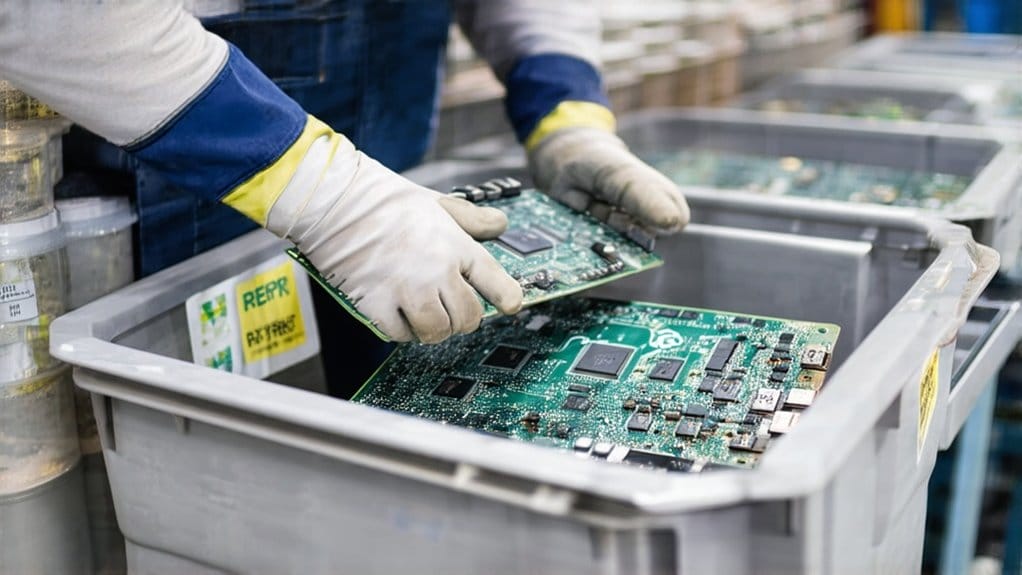
Ottawa’s electronic recycling process is a multifaceted system designed to secure the responsible disposal of electronic waste. You can drop off your electronic devices at designated locations, including public drop-off sites like Staples and Best Buy, or the Ottawa Valley Waste Recovery Centre’s e-waste depot. Various electronic devices are accepted, including computers, printers, televisions, and cell phones.
Once collected, electronics are transported to certified recyclers that follow proper recycling protocols. These facilities guarantee environmental safety and shred devices into their component parts. Hazardous materials are removed, and elements are sorted and extracted for recycling. The shredded materials undergo dust extraction and magnetic separation to categorize materials further.
The retail sector plays a vital role in the recycling process with retailer return programs. The recycling process involves manual disassembly, categorization, and sorting of materials. Recycled materials are prepared for resale or repurposing.
You can also take advantage of bulk pickup services or free pickup services offered by some providers. Ottawa’s electronic recycling process is designed to protect the environment and groundwater from toxic materials. By participating in this process, you contribute to responsible e-waste disposal and the production of new products from recycled materials.
Ensuring Security in Recycling
Security protocols play an essential role in the electronic recycling process. You must guarantee compliance with data protection regulations to safeguard sensitive information. This involves using certified data erasure methods like NIST guidelines or DoD standards, which assure the complete removal of sensitive data.
Additionally, implementing chain-of-custody management provides transparency and control over end-of-use devices, while secure handling and storage procedures prevent unauthorized access.
You should also back up essential data before recycling and remove external storage devices like USB drives or SD cards. When handling broken electronics, use gloves for safety and properly package devices to prevent damage during transport.
It’s also vital to securely dispose of batteries and other hazardous materials. When partnering with recyclers, look for R2 certified companies that adhere to cleanliness and responsibility standards. Transparency in the recycling process and clear documentation also help maintain trust.
Regular audits and checks guarantee consistent quality in data security practices. Organizations that fail to prioritize data security can result in identity theft and reputational damage.
Environmental Impact of Recycling
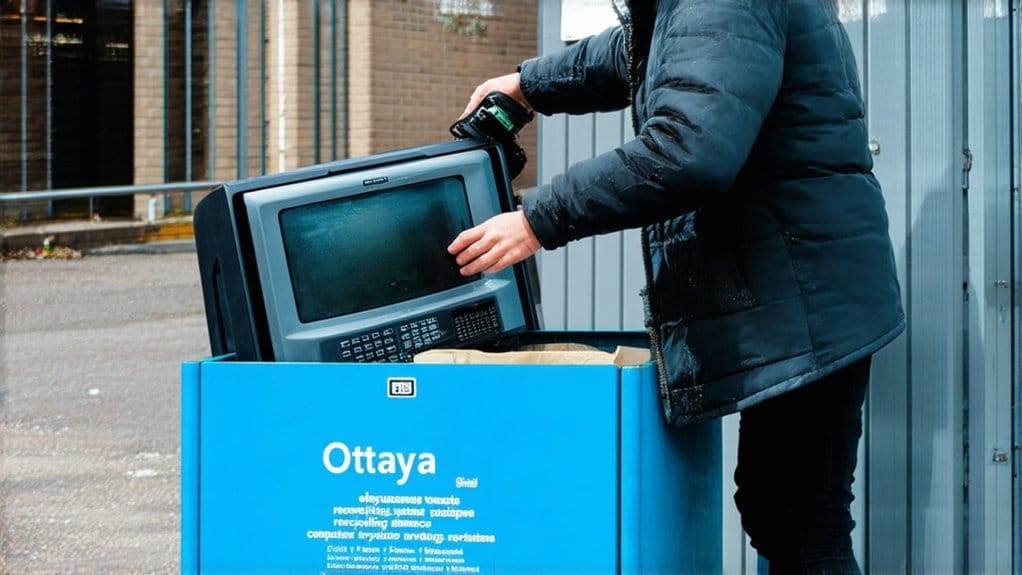
Approximately 20-50 million metric tons of electronic waste are generated worldwide each year, making e-waste a significant contributor to environmental pollution.
When you dispose of electronics improperly, toxic chemicals like lead, mercury, and cadmium contaminate soil and water, rendering it unsuitable for agriculture.
Burning e-waste releases toxic fumes, including dioxins, into the atmosphere, while decomposition in landfills produces greenhouse gases like methane and carbon dioxide.
Local Electronic Recycling Options
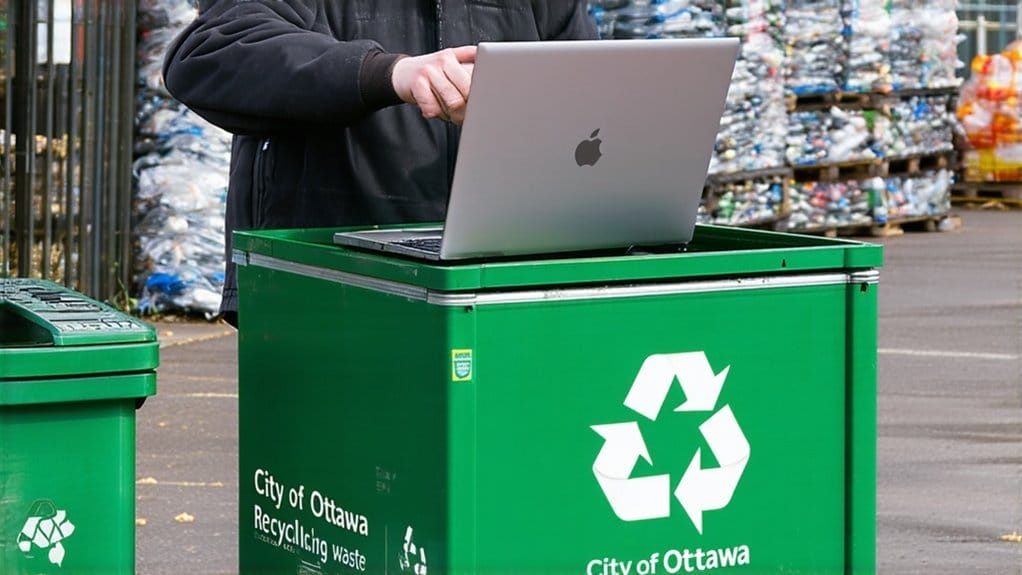
When disposing of electronic waste in Ottawa, it’s essential to evaluate local electronic recycling options that prioritize safe, secure, and environmentally responsible practices.
In Ottawa, several drop-off locations offer electronic recycling services, including Electrobac, Staples, Best Buy, and eCycle Solutions. You can find these drop-off locations at various sites throughout the city, such as Manulife Place, Ottawa Core, and Carleton University.
Some certified recycling facilities also operate in Ottawa, such as eCycle Solutions and the Electronics Products Recycling Association (EPRA). EPRA’s affiliate drop-off sites, including the OVWRC E-Waste Depot, allow residents to recycle a range of electronic devices, from computers and laptops to printers and televisions.
OVWRC also organizes environmental days for residents of specific towns and townships. Other recycling centers in Ottawa accept various electronics for recycling, but some items, like batteries and televisions, may be subject to specific guidelines.
Familiarize yourself with these local electronic recycling options to guarantee that you handle your electronic waste in a responsible manner. For additional convenience, some providers offer logistical support, device refurbishment, secure data destruction, and donation options.
Best Practices for Electronics Disposal
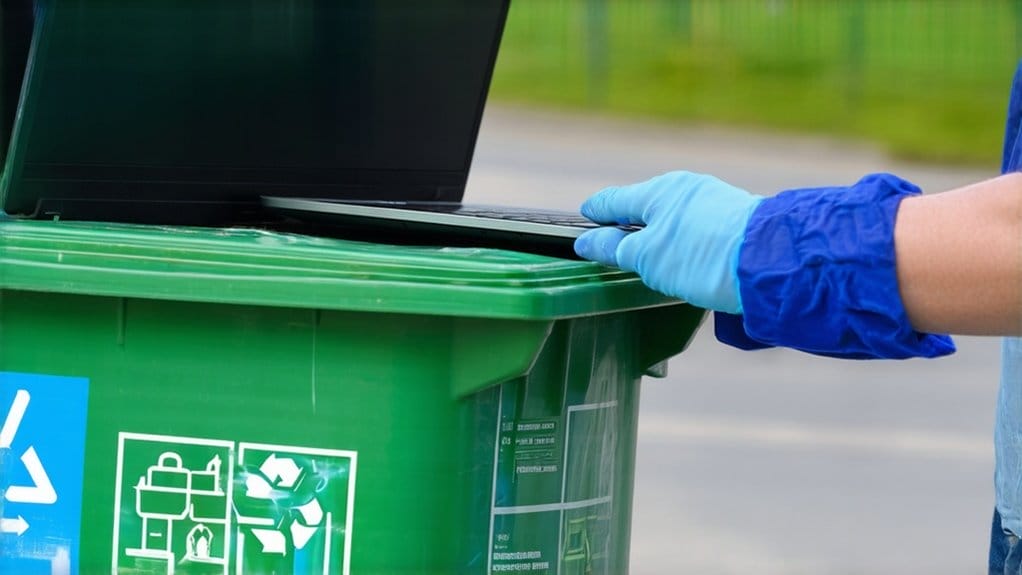
To guarantee the safe and responsible disposal of electronic waste, it’s vital that you adopt best practices that prioritize environmental sustainability and data security.
When preparing electronics for disposal, you must remove all personal and sensitive information from devices and separate batteries for separate recycling. Use reliable data erasure software or consult an IT professional to safely erase data.
It’s also essential to handle electronics carefully to minimize breakage and guarantee safe transport.
Choose certified recyclers, such as those certified by R2 or e-Stewards, to guarantee high environmental standards and data security.
Participate in manufacturer take-back programs, retailer recycling programs, or community e-waste recycling events.
Make sure recyclers follow safe stacking and packaging practices for electronics transportation.
Conclusion
You’ve taken the first step in responsibly disposing of your electronics in Ottawa. By recycling, you’re helping to conserve natural resources and reduce the environmental impact of e-waste. Did you know that recycling just one ton of e-waste can save 15 pounds of copper, 2 pounds of gold, and 1 pound of silver? By following Ottawa’s guidelines and participating in community e-waste events, you’re contributing to a more sustainable future for our planet.

